|
|
|
Sort Order |
|
|
|
Items / Page
|
|
|
|
|
|
|
| Srl | Item |
| 1 |
ID:
160359
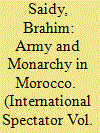

|
|
|
|
|
| Summary/Abstract |
The study of the complex relationship between army and monarchy in Morocco provides support for the argument that coup-proofing and institutionalisation enable civil leadership to enhance and maintain civilian control over the military. Through a strategy of coup-proofing implemented by the monarchy to protect itself from coups d’état, the army had been depoliticised. Through institutionalisation the Moroccan army is now governed by a clear set of constitutional and legal norms, principles and procedures with a system based on meritocracy. This approach is helping to stabilise relations between state and society and avoid power struggles between civilian leaders and the armed forces.
|
|
|
|
|
|
|
|
|
|
|
|
|
|
|
|
| 2 |
ID:
151112
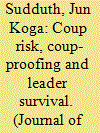

|
|
|
|
|
| Summary/Abstract |
Under what conditions do political leaders enact ‘coup-proofing’ strategies? There is a broad consensus in the literature that political leaders who face a higher risk of a coup will employ coup-proofing strategies that reduce the military’s capabilities to organize a coup. A closer look at the theory and empirical analyses of earlier studies, however, suggests that the presumed relationship between coup risk and coup-proofing should be re-examined. Drawing on insights from formal studies of authoritarian power-sharing, this article proposes that political leaders become less likely to initiate coup-proofing efforts as the coup risk increases. The reason is that leaders’ coup-proofing actions in themselves could prompt the military to launch a coup and thus political leaders will hesitate to offend officers when they face a high risk of a coup. The statistical models in this article estimate a latent coup risk by aggregating multiple indicators that capture the military’s willingness and ability to organize a coup. The empirical results strongly support the proposition that coup-proofing efforts taken by leaders decrease as coup risk increases.
|
|
|
|
|
|
|
|
|
|
|
|
|
|
|
|
| 3 |
ID:
183751
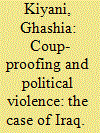

|
|
|
|
|
| Summary/Abstract |
This article examines the impact of coup-proofing on political violence while a leader is in power and during regime transition. This study focuses on the case of Iraq during Saddam Hussein’s rule between 1979-2003 and including the aftermath of the 2003 US invasion, which led to Saddam’s removal from power. The article argues that Saddam Hussein’s coup-proofing strategies allowed him to implement political violence and human rights abuses against the wider population. Moreover, Saddam’s coup-proofing strategies exacerbated violence beyond his rule by driving his former regime loyalists into violent insurgencies as well as indirectly by setting up a society with large amounts of distrust between loyalists and others.
|
|
|
|
|
|
|
|
|
|
|
|
|
|
|
|
| 4 |
ID:
165433
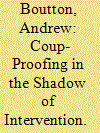

|
|
|
|
|
| Summary/Abstract |
How does the anticipation of external support affect dictators’ domestic political behavior? We lack a convincing explanation for why authoritarian leaders often attempt to consolidate power in ways that heighten the risk of violence and endanger the regime. Adapting the moral hazard framework from the alliance literature, I argue that the anticipation of military support from allies lowers the potential costs of regime purges. This reduces the incentives for dictators to govern inclusively, encouraging more aggressive coup-proofing actions and generating a higher risk of retaliatory violence. Using new data on elite purges in authoritarian regimes, I find that defensive alliances increase the propensity of dictators to aggressively consolidate power. In addition, these types of alliances lead to purges of more powerful elites, which, in turn, increase the likelihood of post-purge large-scale violence. By contrast, forms of external support that entail less commitment by the patron do not have these effects. I provide an overview of the origins of the 1998–1999 civil war in Guinea-Bissau to complement the novel empirical results and to illustrate the causal logic of the argument in the context of West African alliance politics.
|
|
|
|
|
|
|
|
|
|
|
|
|
|
|
|
| 5 |
ID:
187552
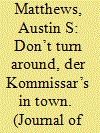

|
|
|
|
|
| Summary/Abstract |
How do dictators coup-proof their armed forces from within the barracks? Coup-proofing is an important aspect of autocratic survival, but execution can be challenging due to the secrecy of plots and the vast size of the armed forces. Counterbalanced state security forces are more effective at resisting coups, but less effective at noticing signs of plots before they can be launched. If dictators wish to prevent coup attempts from occurring in the first place, they may decide to recruit and commission cadres of loyalists directly into the armed forces as political officers, tasked with monitoring for and reporting signs of disloyalty within the ranks. This article explores the development and use of these political officers within dictatorships, arguing that they are especially effective at preventing coup attempts. It also makes the case that their institutional design, while effective at detecting coup plots, makes them less useful at resisting coups that have reached the execution phase. I test these arguments on a cross-national sample of dictatorships from 1950 to 2010, finding strong evidence that political officers are incredibly effective coup detectors, but not coup resisters. These findings have important implications, particularly as several resilient modern dictatorships continue to rule with well-developed political officer systems.
|
|
|
|
|
|
|
|
|
|
|
|
|
|
|
|
| 6 |
ID:
163574


|
|
|
|
|
| Summary/Abstract |
It is paradoxical that authoritarian leaders often hold power for long periods of time, despite their states being plagued with rebellion. Scholarship has argued the practice of coup-proofing is potentially responsible for this trend. However, though regular armed forces are often allowed to whither when coup-proofing, states often retain substantial capabilities in the form of well-armed and well-trained coup-proofing units. This article argues that coup-proofing is more likely to contribute to rebellion when leaders are hesitant to deploy their coup-proofing units: when coup risk is high. Using a global sample of authoritarian regimes for the years 1971–2011, tests indicate that heavily coup-proofed regimes do in fact see a considerable increase in civil war likelihood when the risk of a coup is high but see no change in conflict propensity when coup risk is low.
|
|
|
|
|
|
|
|
|
|
|
|
|
|
|
|
| 7 |
ID:
141168
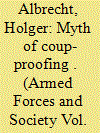

|
|
|
|
|
| Summary/Abstract |
This article argues that coup-proofing does not necessarily reduce the general propensity among military officers to stage coups d’état against authoritarian incumbents. Sophisticated coup-proofing terminates coup cascades and buys incumbent rulers time in office, but general coup risk remains high even if they maintain power for long periods of time. The article uses a new data set on coups in the Middle East and North Africa covering the period 1950–2013. The data reveal that the number of coup instances has decreased over time, but the risk for incumbents of falling to a coup during their extended time in office remains constant, even in coup-proofed autocracies. When autocrats apply coup-proofing measures, timing and agency become increasingly important. Plotters attempt coups either immediately after power turnovers or when incumbents turn into lame ducks after excessively long periods of rule. Success rates increase when coup plotters are supported by central military leaderships.
|
|
|
|
|
|
|
|
|
|
|
|
|
|
|
|
| 8 |
ID:
185545
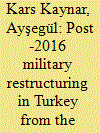

|
|
|
|
|
| Summary/Abstract |
This article focuses on the post-2016 military reforms and examines the meaning of civilian oversight and control that these reforms have brought. For almost two decades, the establishment of civilian supremacy over the military has been discussed in terms of democratic control of the armed forces. The article claims that although the post-2016 reforms installed civilian supremacy, they diverge from this approach significantly. Instead, they display the basic characteristics of coup-proofing strategies. The article aims to ignite scholarly interest in and initiate discussions on the conceptual appropriateness of the notion of coup-proofing for capturing Turkey’s civil–military relations since 15 July 2016.
|
|
|
|
|
|
|
|
|
|
|
|
|
|
|
|
| 9 |
ID:
160785
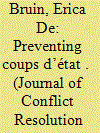

|
|
|
|
|
| Summary/Abstract |
Although coups remain a pressing concern for rulers across the globe, the mechanisms through which common coup-prevention strategies operate have not been well theorized or rigorously tested. This article analyzes how “counterbalancing” the military with other security forces prevents coups. Using new cross-national time-series data on state security forces along with evidence from sixteen case studies, the article demonstrates that counterbalancing reduces the likelihood that coup attempts will succeed and that it does so primarily by creating incentives for some soldiers to resist the coup, rather than by creating barriers to coordination between forces. However, counterbalancing is not associated with fewer coup attempts. In fact, the creation of a new security force increases the odds of a coup attempt in the following year. These findings highlight potential costs associated with counterbalancing and explain why it is not more widespread.
|
|
|
|
|
|
|
|
|
|
|
|
|
|
|
|
| 10 |
ID:
160979
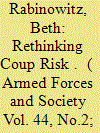

|
|
|
|
|
| Summary/Abstract |
Military interventions continue to be prevalent in Africa. In the 21st century alone, 14 coups have been successfully staged. Whereas most studies of coup risk examine how militaries are organized or what structural conditions are associated with coups, we take a novel approach. We explore how coalition politics relate to coup risk. It has long been observed that regimes try to hold power by buying off urban consumers. We argue that focusing on urban consumers actually makes regimes more prone to military intervention. Instead, leaders who ally with established rural elites are more effective at thwarting coups. To test our hypothesis, we develop a unique data set of rural political strategies, coding regimes in 44 sub-Saharan countries from 1960 to 2000. Using a continuous-time Cox proportional hazards regression model, we find a robust correlation between policies supportive of rural elites and lower coup risk.
|
|
|
|
|
|
|
|
|
|
|
|
|
|
|
|
| 11 |
ID:
120281
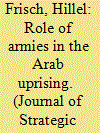

|
|
|
|
|
| Publication |
2013.
|
| Summary/Abstract |
The following special issue on the role of armed forces focuses on what explains the considerable variation in the both how these uprisings palyed themselves out and their political outcomes.At least three basic dimensions - duration, political intensity and the magnitude of violence - the variation between the six states covered in this issue - Egypt, Syria, Libya, Tunisia, Yemen and Bahrain - has been considerable even on a proportionate basis. The range of political outcomes within these six cases has been considerable, ranging from a more or less stable transition to democracy in Tunisia to the Syrian case where there is considerable fear that Syria will break up into sectarian mini-states.
|
|
|
|
|
|
|
|
|
|
|
|
|
|
|
|
| 12 |
ID:
135229
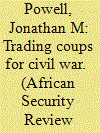

|
|
|
|
|
| Summary/Abstract |
This paper investigates civil conflict as a product of the survival strategies of African leaders. Specifically, the paper offers a theory of risk substitution that predicts coup-fearing leaders will undermine the military effectiveness of the state when making an effort to extend their own tenure. While ‘coup-proofing’ practices have often been noted as contributors to political survival, considerably less attention has been paid to the influence of these strategies on other forms of conflict. Utilising data from a number of cross-national datasets, the analyses show that having a higher number of ‘coup-proofing’ counterweights significantly worsens a state's civil conflict prospects. A brief consideration of multiple episodes of conflict further suggests that in addition to coup-proofing undermining the counterinsurgency capacity of the state, some leaders are simply indifferent to – or can even potentially benefit from – the existence of an insurgency.
|
|
|
|
|
|
|
|
|
|
|
|
|
|
|
|
| 13 |
ID:
188798
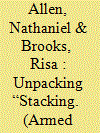

|
|
|
|
|
| Summary/Abstract |
This article unpacks the phenomenon of identity-based stacking in armed forces to lay the groundwork for a next generation of scholarship, proposing three sets of extensions with examples from regimes in Africa and the Middle East. First, we argue that scholars might treat the concept of stacking with greater nuance by considering variation in stacking’s modal forms, incorporating identities beyond ethnicity, considering how the salience of stacking varies within armed forces, and treating the identities on which stacking is based as malleable. Second, we argue for a more attention to the mechanisms through which stacking operates, such that it can involve layering of multiple bases of identity, be used to manipulate and manufacture identity, and be used to induce in-group competition and rivalry. Finally, stacking scholarship should consider more the costs to a leader’s control over policy and distributional matters and emphasize the trade-offs that various forms of stacking generate among regime security imperatives.
|
|
|
|
|
|
|
|
|
|
|
|
|
|
|
|
| 14 |
ID:
147836


|
|
|
|
|
| Summary/Abstract |
Does class inequality increase the risk of civil war? I posit that inequality between social classes affects civil wars through two pathways: (1) it heightens the risk of political violence by fueling distributive conflicts; and (2) it reduces structural coup-proofing, which, in turn, increases the capacity of the military to fight insurgents. Combining these effects implies that the net effect of class inequality on civil war is ambiguous. Although class inequality increases the propensity for violence, in unequal countries political violence rarely takes the form of wars because such countries have strong militaries. Class inequality, however, breeds other forms of political violence. In particular, it increases the likelihood of military coups. The two effects of class inequality reinforce each other in the case of coups: inequality simultaneously stirs distributional conflicts and increases the capacity of the military to mount coups by reducing coup-proofing. Using data on 128 developing countries between 1960 and 2008, I find that while class inequality fosters coups, it has no discernible effect on civil wars. I also provide evidence consistent with my causal mechanisms: (1) inequality creates greater threat to the rulers by fueling political instability; (2) inequality reduces structural coup-proofing; and (3) structural coup-proofing increases the likelihood of civil war.
|
|
|
|
|
|
|
|
|
|
|
|
|
|
|
|
| 15 |
ID:
169000
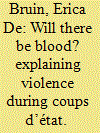

|
|
|
|
|
| Summary/Abstract |
Although just under half of all coup d’état attempts involve fatalities, there has been surprisingly little attention to the conditions under which coups turn violent. Existing research emphasizes the incentives coup plotters have to avoid bloodshed but does not explain the conditions under which violence nonetheless occurs. This article develops a theoretical framework that predicts that the extent of violence that occurs during coup attempts will vary systematically with central features of incumbent regimes and coup plotters. It then tests these predictions using new data on the fatalities associated with 377 coup attempts between 1950 and 2017. Coups against military regimes are found to be less violent than those against civilian dictatorships. This is because military rulers are better able to estimate the likelihood of the coup succeeding and more sensitive to the costs associated with using violence to suppress a coup. Since their post-coup fates tend to be better than those of other authoritarian leaders, they also have fewer incentives to hang on to power at any cost. The analysis also demonstrates that coups led by senior officers involve less bloodshed than those by junior officers and enlisted men. However, coups against rulers that counterbalance their militaries are no more violent than those against rulers that do not. The results shed new light on the dynamics of coup attempts.
|
|
|
|
|
|
|
|
|
|
|
|
|
|
|
|
|
|
|
|
|